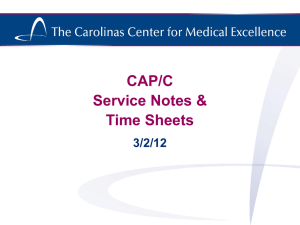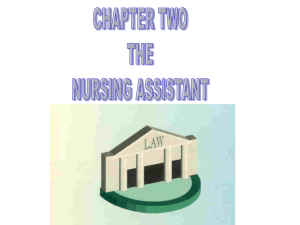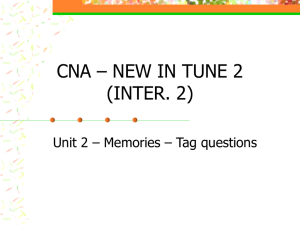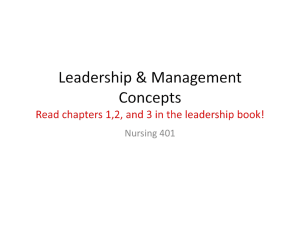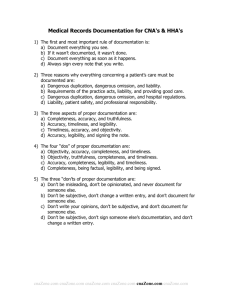File
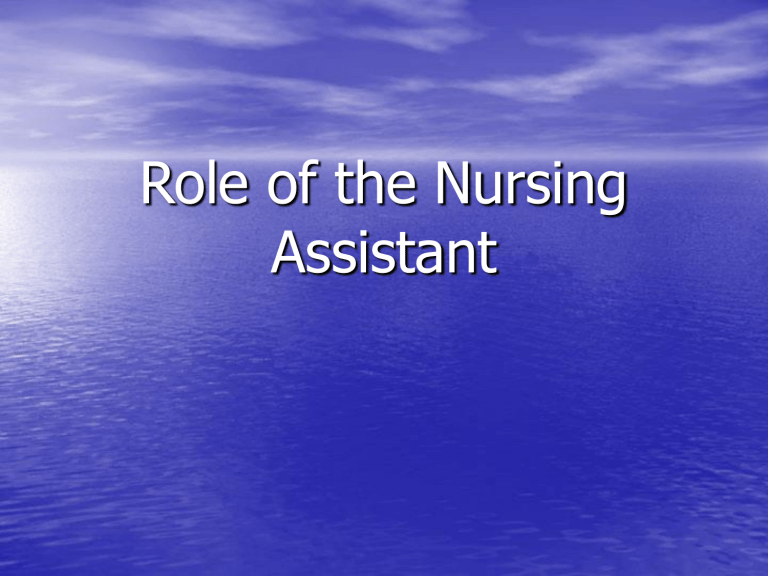
Role of the Nursing
Assistant
Interdisciplinary Team
•
A group of professionals from different health care disciplines who each contribute their expertise to the care of a single patient
Interdisciplinary Team
• Members
– Physicians make a diagnosis and prescribe medication
– RN’s plan and direct the nursing care ordered by the physician
– CNA’s provide direct patient care under the supervision of an RN or LPN
– Aides, therapists, and support persons all contribute to this team
The Nursing Team
• RN
– Licensed-pass a state board exam
– Assess, plan, evaluate and coordinate aspects of patient care
– Educate patients and their families
– Provide nursing care and supervise duties they delegate to others
– May specialize in any specific area of nursing practice
HS-NE-10b
The Nursing Team
• LPN/LVN
– Licensed-passed state board exam
– Works under the supervision of a RN, MD or
Dentist
– Provides most of the care when patient’s nursing needs are not complex
– Assists the RN in more complicated situations
HS-NE-10b
The Nursing Team
• CNA
– Trained to assist in the care of patients under the supervision of RN or LPN
– May be called:
• Patient care attendant
• Nurse’s aide
• Clinical support associate
• Nursing assistant
• Health care aide
• Patient care technician
• Personal care assistant
HS-NE-10b
Patient Focused Care
• Emphasizes the needs of the patient above the convenience of other departments involved with patient care
– Limits the # of people involved in the care
– Contains cost
– Meet patients’ needs efficiently
• Cross-trained workers are utilized
What can the CNA do to be an effective member of the team?
• Recognize the importance of all team members
• Appreciate each others’ contributions to the team
• Learn as much as you can about your patient’s and their families to better understand their feelings and concerns
• Attend care plan conferences and give your observations/ideas
• Attend in-service training sessions
• Become cross-trained
• Cooperate with other team members to provide patient focused care
HS-NE-10a
Regulation of Nursing Assistant
Practice
• 1987-Omnibus Budget Reconciliation Act
– Regulates CNA education and certification
– Includes statements from the Dept of Health and
Human Services and the Center for Medicare and
Medicaid Services (states the minimum requirements for CNA training)
– Nurse Aide Competency Evaluation Program was started to guide individual programs to meet the requirements of OBRA
– Georgia Medical Care Foundation is Georgia’s regulatory agency and must meet federal standards
HS-NE-6c
Certified Nursing Assistant Training
• Students must complete 85 hrs of classroom/lab time plus clinical experience
• Clinical skills must include
– Basic nursing skills
– Basic restorative skills
– Mental health and social service needs
– Personal care skills
– Resident rights
– Safety and emergency care
Certified Nursing Assistant Training
• You are given 3 opportunities to meet the requirements of testing
• You must work at least 8 hours for pay in a LTCF within 24 months time
• You must receive 12 hours of continuing education every year
• You must meet all requirements to renew every 2 yrs
Line of Authority
• Health care facilities all have different lines of authority or chain of command
• LTCF’s
– CNA, LPN, RN Charge Nurse, Director of Nursing,
Administration
• Hospitals
– CNA, Nurse (RN, LPN), Charge Nurse, Nurse or Unit
Manager, Director of Nursing, Administration
• As a SNA, your teacher or the person designated as your supervisor (CNA) is your immediate authority
Line of Authority
• Know your facility’s organizational structure
Registered
Nurse
Physician
Charge Nurse
RN
Team Leader
RN or LPN
CNA
The Patient
Guidelines to Follow
• Work with your line of authority when solving problems
• Always begin with your immediate supervisor and work your way up if you hit a roadblock
• Only perform the tasks that you have been trained to do!!
• Always ask for help, even if it is related to a skill you have been trained to do.
HS-NE-6b
Guidelines to Follow
• Remain within your scope of practice.
• Politely refuse and explain why
• CNA’s do not take orders from physicians or discuss the patient’s status, medical record or results of any tests or vital signs
• Always be willing to learn new skills that are within your scope of practice
CNA Role and Responsibility
• Works directly with the patient, giving physical care and emotional support
• CNA’s are interested in others and take pride in their work
• CNA’s are willing to learn new skills to care for those who are ill
• CNA’s can contribute much to the patient’s safety and comfort
CNA Role and Responsibility
• CNA’s see the patient more than any other member of the nursing team
• CNA’s make observations that can give valuable insight into the patient’s illness and attitude
• Patient’s may make more “bonds” with you than other members of the health care team and share with you “minor complaints” they may not tell their physician or nurse
Personal Adjustments
• Accept constructive criticism
• Follow rules and orders promptly
• Show dependability and accuracy be being on time and completing your assignments
• Respect your coworkers and the role you share on the health care team
• Be empathetic (not sympathetic), patient and tactful with others (patients and coworkers)
Personal Adjustments
• Develop good interpersonal relationships
– Be warm and pleasant to others
• Your attitude is the most important characteristic you bring to your job
– Caring, courtesy, cooperation
– Emotional control, tact, patience
– EMPATHY or UNDERSTANDING
Personal Adjustments
• Develop good relationships with your patients
• Show empathy for the patient by being eager to serve and by using a gentle touch
• You may have patients with different problems or concerns, but to a patient, his/her own problems are the most important
Personal Adjustments
• Not all patient responses are about YOU or your job performance
• Patients may become irritable, complaining or uncooperative because of
– Fear about their diagnosis, disability or death
– Pain
– Worries about family or the future
– Loss or lack of social support systems
– Dependence on others
– Financial concerns
• A gentle touch and reassurance can help
• Report these concerns to the nurse
Personal Adjustments
• You must also meet the family’s needs
• They may also be uncooperative and demanding because they are worried about their loved one
• Patience and tact are most useful here
• Just listening can help
• Watch body language as it may give you clues as to the family’s feelings
Personal Adjustments
• You are part of a team whose goal is to help the patient
– Remember your role
– Do not overstep your authority
– Listen to instructions carefully
– Watch your tone of voice and body language
– Promptly carry out orders and report unfinished work
– Offer to help others and accept help when you need it
– Have a positive attitude
Personal Adjustments
• You are part of a team whose goal is to help the patient
– Extend common courtesy and dignity to staff
– Keep the common goal in mind and recognize coworkers as integral parts of the team
– Understand and follow facility policies and procedures*
– Treat all with respect
– Practice good hygiene, nutrition and stress reduction
HS-NE-6d
Personal Hygiene
• Bathe daily
• Use deodorant
• Good oral hygiene
• Clean hair, pulled back
• Short, clean natural nails-clear polish only
• Only stud earrings, wedding band and watch are allowed
• Clean socks or stockings
• Well fitting shoes
Uniforms
• LCCS requires white with white shoes
• Clean, wrinkle free
• Repair torn hems and missing buttons
• Not worn when not on duty
• Remove inside out
• ID badge required
• Keep in mind that your appearance says a lot about you in a patient’s eyes
• A well-groomed appearance says you have pride in yourself and your work
Stress, Stress, Stress
• Avoid burnout by reducing stress
– Sufficient rest
– Good nutrition
– Leisure activities
– Stress reduction
– Group discussion
– Stress management
– Exercise programs
• Personal Stress
Reduction
– Go for a walk
– Devote time to hobbies
– Herbal tea
– Relaxation exercises
– Quiet music
– Warm, relaxing bath
There are many ways to reduce stress other than relying on drugs or alcohol to change your mood. Don’t get into a situation you can’t get out of because of stress

